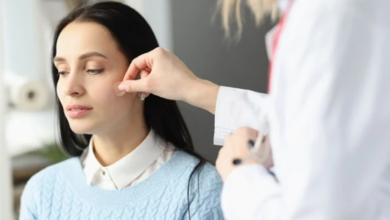8 Causes Of Sore Nipples: Symptoms, Treatments, & More
Ouch! Is feeding time with your little one turning into a moment of discomfort instead of bonding? New moms, we feel you & here’s good news—understanding the causes of nipple soreness and learning ways to treat it can make a big difference. Thus, helping you create a more comfortable breastfeeding experience. If you are a new mother facing this situation or know someone who is, this blog is for you. In the following blog, we’ll see the eight most common reasons behind sore nipples and understand the ways to get rid of them. Plus, let’s discover a natural solution, AreoVeda’s Natural Nipple Butte, to help you navigate this phase with comfort and ease. So, let’s dive in and start exploring the causes of nipple soreness!
Common Causes of Sore Nipples and How to Manage Them
1. Improper Latch
Poor latch is one of the common contributors to sore nipples. When a baby cannot latch straight onto the breast nipple, it causes lacerations, which leads to soreness. This may be relieved by changing the position of your baby and opting for other comfortable ways to nurse. A lactation expert might also offer personalised counselling that helps both you and your baby establish a good latch.
2. Dry Skin
Dry nipples can be another cause of sore nipples, either from over-washing or staying in a very dry environment. Symptoms would include feeling sensitive, itching, and flakiness. For relief, moisturising is key. AreoVeda’s Natural Nipple Butter soothes irritated dry skin while locking in moisture with its rich, non-greasy, nourishing formula. There are no harsh chemicals present, offering safe, natural relief for even the most sensitive skin to improve your breastfeeding experience.
3. Nipple Infections
Infections like thrush would be accompanied by a lot of pains and discomfort in the nipples. Thrush is characterised by intense soreness, redness, and occasionally white patches on the nipples. If you suspect an infection, consult a healthcare professional for appropriate treatment. Antifungal medications may be necessary, and maintaining good hygiene can help prevent infections from recurring.
4. Breast Engorgement
Breast engorgement occurs when breasts become overly full, leading to swelling and tenderness. Some signs of engorgement are tightness, heaviness, and pain. To relieve engorgement, feed or pump more often and a warm compress before feeding may help soften the area. Application of a cold pack after feeding may also help reduce swelling and discomfort.
5. Allergic Reactions
Another potential cause for sore nipples may be due to allergic reaction to any personal care items, including laundry detergents. Some of the most common symptoms of these conditions are redness, itching, and even burning. To minimise irritation, switch to hypoallergenic and fragrance-free products. The Natural Nipple Butter by AreoVeda is just great because it does not contain irritants and thereby creates a gentle, safe barrier for sensitive skin.
6. Hormonal Changes
Changes in the hormonal levels, especially during pregnancy and the early breastfeeding months, can make nipples more sensitive. The symptoms may include tenderness and slight swelling accompanied with sharp pain. Drinking plenty of water and maintaining a healthy diet will help you alleviate the above mentioned symptoms, ensuring a more comfortable breastfeeding experience.
7. Friction or Chafing
Nipple soreness during breastfeeding can also be caused from friction against clothing or nursing pads. Symptoms of chafing include redness and tenderness that worsens with feeding. To reduce friction, wear soft, breathable fabrics and change nursing pads regularly. Again, applying a soothing and hydrating nipple cream such as AreoVeda’s Natural Nipple Butter can create a protective barrier on the skin, easing irritation caused by friction.
8. Poor Breastfeeding Technique
Finally, sore nipples can also stem from poor breastfeeding techniques, such as improper positioning or inconsistent timing. Signs of this include persistent pain and difficulty feeding. To improve technique, consider attending breastfeeding classes or consulting a lactation expert. Practising skin-to-skin contact can help your baby latch more naturally, creating a smoother feeding experience.
Tips for Treating and Preventing Sore Nipples
Here are some effective tips for preventing and treating sore nipples.
- Practise Good Hygiene: Keep the nipples clean and dry. Also, ensure to always wash your hands properly before breastfeeding to avoid any infection.
- Use Natural, Soothing Products: Opt for a natural, breastfeeding-safe nipple butter or cream like AreoVeda’s Natural Nipple Butter. It can help to hydrate and soothe the affected skin around your nipples for a comfortable breastfeeding experience.
- Switch Breastfeeding Positions: Altering positions can help balance the pressure on the nipple evenly, allowing any sore areas to heal.
- Wear Loose Clothing: If possible, try wearing breathable, cotton nursing bras to improve air circulation and reduce friction.
- Stay Hydrated: Adequate fluid intake promotes skin health, preventing dryness and enhancing elasticity.
- Seek Professional Help if Needed: If nipple soreness persists or worsens, see a healthcare professional or lactation consultant.
Conclusion
Sore nipples can make breastfeeding experience quite uncomfortable, but understanding the causes and treatment options makes a significant difference. Whether it’s adjusting your baby’s latch, addressing dry skin, or using a nourishing product like AreoVeda’s Natural Nipple Butter, proactive steps can help manage discomfort and enhance your breastfeeding journey. Remember, you’re not alone, and help from lactation consultants, friends, and healthcare providers is always within reach to make your breastfeeding experience as pleasant as possible.




